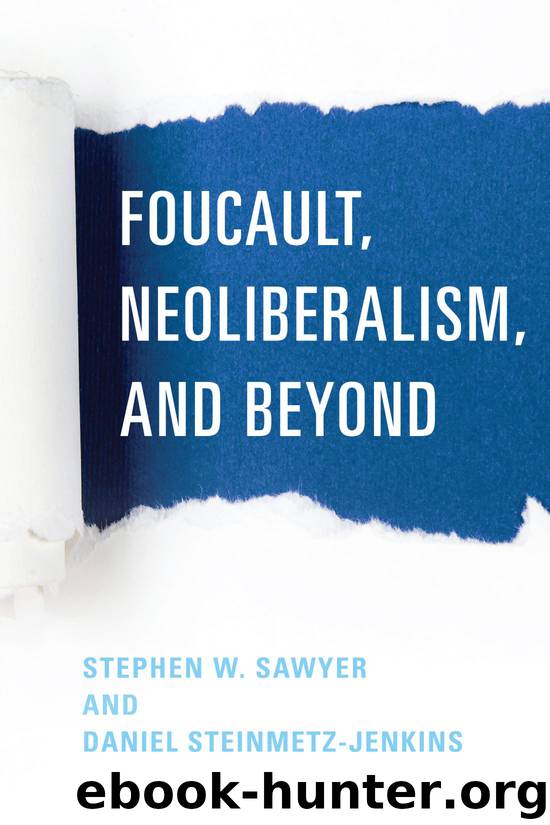Foucault, Neoliberalism, and Beyond by Sawyer Stephen W.;

Author:Sawyer, Stephen W.;
Language: eng
Format: epub
Publisher: Book Network Int'l Limited trading as NBN International (NBNi)
Chapter 5
Foucault, Genealogy, Critique
Dotan Lesham
This chapter contextualizes Foucault’s lectures on neoliberalism in the overall oeuvre of the Collège de France lecture series. Returning to Foucault’s inaugural lectures from 1970–1971, I suggest they should be read as a series of genealogical inquiries into regimes of veridiction. They were intended to bring Nietzsche’s project to completion by doing in history what Nietzsche had accomplished in philosophy: that is, writing the history of thought as a history of subjecting the will to know to the sovereignty of truth by showing how this knowledge forms a regime of veridiction when transcribed into power. This project was not only meant to free knowledge but, more importantly, to do so by surpassing the politics of truth. The project of writing the history of regimes of veridiction was to be completed by a series of lectures on the history of neoliberal governmentality, the prevailing prominent form of power. Foucault’s lectures on neoliberalism suggest that this regime established in governmentality what he sought to do by writing its history: that is, by postulating a “conduct of conduct” that was not subjected to the sovereignty of any specific truth. In The Birth of Biopolitics, Foucault described how this was done, both theoretically and technically. In economic theory it was achieved by releasing the market from being a site of veridiction, and by the way human capital frees homo economicus from the truth value imposed on it by the value of her labor. The same aim was achieved, as Foucault showed, by a change in the technologies of government and self: (1) through negative income tax, as a way of releasing the government of the poor from the regime that distinguishes between the “good” and the “bad” poor; and (2) the “anthropological erasure of the criminal” that brought about a “massive withdrawal with regard to the normative-disciplinary system.” Looking both at the change in theory and in the two localized apparatuses of a new regime of knowledge indicates that neoliberalism performs a massive overhaul of liberal governmentality. Like Nietzsche in philosophy and Foucault in history, this is done by dissociating knowledge of government and truth, which goes hand in hand with disassociating the subject from its intrinsic truth. As I will suggest in the third section of this chapter, which deals with critique, Foucault’s research into the neoliberal “post-truth” government led him, in the 1980s, to look for a critical ethos of parrhesiastic truth-telling as a way out1 of all forms of pastoral power.
Foucault: “The Opening Up of Fields of Problematization”
The debate concerning Foucault’s sympathies with neoliberalism, as reflected in his lectures at the Collège de France, has brought to the fore a fundamental question: How should one interpret these Collège de France lectures as a whole? One might embrace Bernard Harcourt’s “cautious interpretive position” and read the lectures as a “first draft: What he [Foucault] did not feel that he needed to say or necessarily wanted to say.”2 Another option is to accept Colin Gordon’s critique of Harcourt, and read each year’s lectures as a complete work that was never meant to be published in book form.
Download
This site does not store any files on its server. We only index and link to content provided by other sites. Please contact the content providers to delete copyright contents if any and email us, we'll remove relevant links or contents immediately.
| Anthropology | Archaeology |
| Philosophy | Politics & Government |
| Social Sciences | Sociology |
| Women's Studies |
The remains of the day by Kazuo Ishiguro(8715)
Tools of Titans by Timothy Ferriss(8123)
Giovanni's Room by James Baldwin(7089)
The Black Swan by Nassim Nicholas Taleb(6918)
Inner Engineering: A Yogi's Guide to Joy by Sadhguru(6615)
The Way of Zen by Alan W. Watts(6427)
Asking the Right Questions: A Guide to Critical Thinking by M. Neil Browne & Stuart M. Keeley(5561)
The Power of Now: A Guide to Spiritual Enlightenment by Eckhart Tolle(5509)
The Six Wives Of Henry VIII (WOMEN IN HISTORY) by Fraser Antonia(5335)
Astrophysics for People in a Hurry by Neil DeGrasse Tyson(5080)
Housekeeping by Marilynne Robinson(4229)
12 Rules for Life by Jordan B. Peterson(4207)
The Ethical Slut by Janet W. Hardy(4133)
Double Down (Diary of a Wimpy Kid Book 11) by Jeff Kinney(4112)
Skin in the Game by Nassim Nicholas Taleb(4112)
Ikigai by Héctor García & Francesc Miralles(4024)
The Art of Happiness by The Dalai Lama(3991)
Skin in the Game: Hidden Asymmetries in Daily Life by Nassim Nicholas Taleb(3857)
Walking by Henry David Thoreau(3840)
